- Home
- Marge Piercy
The Cost of Lunch, Etc.
The Cost of Lunch, Etc. Read online
Other books by Marge Piercy
POETRY
The Hunger Moon: New & Selected Poems, 1980–2010
The Crooked Inheritance Hard Loving
Colors Passing Through Us Breaking Camp
The Art of Blessing the Day Early Grrrl
What Are Big Girls Made Of? Mars and Her Children
Available Light My Mother’s Body
Stone, Paper, Knife Circles on the Water (Selected Poems)
The Moon Is Always Female The Twelve-Spoked Wheel Flashing
Living in the Open To Be of Use
4-Telling (with Bob Hershon, Emmett Jarrett and Dick Lourie)
NOVELS
Sex Wars Woman on the Edge of Time
The Third Child Small Changes
Three Women Storm Tide (with Ira Wood)
Going Down Fast City of Darkness, City of Light
The Longings of Women He, She and It
Summer People Gone to Soldiers
Fly Away Home Braided Lives
Vida The High Cost of Living
Dance the Eagle to Sleep
OTHER
Pesach for the Rest of Us
So You Want to Write: How to Master the Craft of Writing
Fiction and the Personal Narrative (with Ira Wood), 1st & 2nd editions
The Last White Class: A Play (with Ira Wood)
Sleeping with Cats: A Memoir
Parti-Colored Blocks for a Quilt: Essays
Early Ripening: American Women’s Poetry Now
The Cost of Lunch, Etc.
Short stories by Marge Piercy
© Middlemarsh, Inc 2014
This edition © 2014 PM Press
All rights reserved. No part of this book may be transmitted by any means without permission in writing from the publisher.
Acknowledgments
“The Cost of Lunch, Etc.,” Aphra. “Saving Mother from Herself,” Ms. Magazine. “Going over Jordan,” Transatlantic Review. “Somebody Who Understands You,” Moving Out. “Do You Love Me?” The Second Wave. “The Retreat,” Provincetown Poets. “The Border,” Crossroads. “Ring around the Kleinbottle,” Fifth Wednesday. “The Shrine,” december. “The Easy Arrangement,” published in an earlier form as “Professor Wrong” in Mr. Wrong: Real-Life Stories about the Men We Used to Love. “Fog,” Paterson Literary Review. “What and When I Promised,” Blue Lyra Review. “Little Sister, Cat and Mouse,” The Second Wave. “I Wasn’t Losing My Mind,” published in an earlier form as “The Necklace” in What My Mother Gave Me: Thirty-one Women on the Gifts That Mattered Most.
ISBN: 978-1-60486-938-5
Library of Congress Control Number: 2013956923
Cover by John Yates / www.stealworks.com
Interior design by briandesign
10 9 8 7 6 5 4 3 2 1
PM Press
PO Box 23912
Oakland, CA 94623
www.pmpress.org
Printed in the USA by the Employee Owners of Thomson-Shore in Dexter, Michigan.
www.thomsonshore.com
Contents
The Cost of Lunch, Etc.
Saving Mother from Herself
Going over Jordan
Scars
She’s Dying, He Said
Somebody Who Understands You
Do You Love Me?
The Retreat
What Remains
The Border
I Had a Friend
Ring around the Kleinbottle
The Shrine
The Easy Arrangement
What the Arbor Said
Fog
What and When I Promised
Little Sister, Cat and Mouse
I Wasn’t Losing My Mind
How to Seduce a Feminist (or Not)
The Cost of Lunch, Etc.
Circa 1970
When the knocking came, Maud was taking a sponge bath.
Grabbing the sheet from the daybed she stuck her head out. One of the old men from the first floor stood there looking sore. “You got a phone call—why don’t you come down to the phone when I call? All the way up here on account of you don’t listen …”
Clutching the sheet she ran for the upstairs extension, right across from the john. Hearing Duncan’s voice she was sure it was all off. “Duncan, what is it? He can’t make it? He won’t meet me?”
“Of course, Maud, don’t get excited. Didn’t I tell you it’s all arranged?” His voice playing cool and dependable. “Just a little change of plans. First, we’re not meeting at my place …”
“Oh.” Goodbye to his wife’s potato salad, the sesame crackers and cheeses—Port Salut, Roquefort, Camembert. All day she had been figuring the odds on salami, slicing those virgin cheeses. Gorgonzola, Gouda, Brie.
“Bill wants to meet us in town, at the Low Blow. There’s a jazz man he wants to hear.” The familiarity of the first name hung on the telephone wire as if with clothespins.
She had an urge to add the last name. The lumpy old man from downstairs had not hung up. He wouldn’t know who W. Saltzman was. They hated her in the roominghouse, her and the two still sexual men up on three: said they were noisy, said they used the phone too much. Doors opened eye-wide behind her in the halls, but when she spoke to them, the old men answered with suspiciously pursed lips if at all. Duncan was warning briskly that she not be late. He would pick her up—he and the wife, chuckle. Damp under the sheet she ran for her room. Duncan was eager to fuck her, would like to set up an extracurricular lay on Fridays after his last class. He taught at the college but lived in a house adorned with oriental carpets in an older suburb. With lumbering suaveness he tried to nudge her guilty for lunches at his expense in an off-campus Italian restaurant. Often he spoke of his friendship with the poet W. Saltzman, discovering in her work even more influence than there was, quoting the great man on trivial occasions. Introducing Saltzman was an attempt to net her in obligation: rubbing herself dry, she grinned.
Rhoda, his wife, was an excellent cook. Rhoda: chicken gently sautéed in white-wine sauce, roast sesame lamb, avocado salad. She would move in, if Rhoda would cook for her. But Duncan was a beefy milk-fed professor; from dead men’s bones he ground plastic bread. He was so sure she was his proper prey, a rootless, nameless arty girl half nuts and outside the pale: because it never, never occurred to him that she might be a real writer.
She put on her good dress—the shade of blue was good, anyhow. The refrigerator held about a glass of milk and something in a napkin. She babysat occasionally for a couple she’d known during her stint teaching at the college. Besides baby food, she’d turned up maraschino cherries, cocktail onions and half a box of animal crackers.
She had consumed the cherries and onions and carried off the box.
She poured out a little milk and sat slowly chewing the crackers, eating each animal paw by paw and the head last.
She crossed to the john then. The light was on, the door ajar. The toilet was filled to the brim, splashing over to puddle the floor.
Lazily, like a carp in the bowl, a long cigar-brown turd floated. She backed out.
She had as landlady an ex-inmate of Treblinka. She would go down tomorrow to complain, and Mrs. Goldman would show her tattoo: Mr. Goldman and the little Goldmen long since ashes. Mrs. Goldman would assure her she was lucky to be in the United States and alive. She would retreat apologizing. Nothing was commensurate, and the plumbing broke every two weeks. Mrs. Goldman would hint she was flushing Tampax down the toilet, and she would deny it. Mrs. Goldman would bat her large weak eyes in disbelief. She and Mrs. Goldman would continue the argument as she backed up the staircase. Then Mrs. Goldman would utter a few Yiddish curses for women of loose morals and retire, slamming her door. Maud would piss in the
sink as she did now, then run over to the college whenever possible. The college, where she had taught until replaced by a PhD, who was equally needy and would be equally badly paid, had useful facilities.
She reread the poems she had gone through five times. Saltzman could tell her where to send stuff, give her introductions, even help her find a job, point her out to editors, tell her how to get a book published. He was power. Besides it was getting to be winter. Though he was not her only literary pa, surely he would not mind the other influences. He was the local celebrity and everybody claimed to know him or his ex-girlfriend or his dentist. Imagining this meeting had soothed her to sleep bitter nights. She felt she was stumbling in darkness about to come round a corner into blinding light and be—not consumed but transfigured. Someday she would make it, why not now? She had to: how else could she survive?
The buzzer rasped. She jumped up. Turned, grabbed the envelope of poems. Saw herself in the bar bearing down on him poems in hand. She took out the bottom three, her cream, shoved them in her purse. Just happened to have on me. Well, shit, he could ask. Shrugging on her mouton coat. Going slowly down she felt the weight of the coat. It had been Sandy’s. A year in the state hatch, insulin, electric shock and hydrotherapy had dulled her, but not enough. When Mrs. Gross decided Sandy was getting too wild and must be put away again, Sandy went up on the apartment house roof and jumped. She saw Sandy’s long gentle face, her tea-brown hair, her freckled hands with the chewed nails, so vividly she could not take in Duncan. Docilely she followed him to the small Mercedes and got in back.
“What, Rhoda?” Maud came back into the present. “Oh, Harry the Tailor got robbed. No, they didn’t smash the window when they robbed him, it was a man and a woman and they cut him up.” She sat with head ducked, assuming Sandy’s old position with hands knit, foot tapping shyly. Dead, stone dead. “No, some kids smashed the window, after.” Mrs. Gross had acted funny when she gave her the coat. Maud had not wanted a fur coat—she thought they were gross, wearing the skin of some poor dead animal, but she did need a coat. Further, she felt she had a right to Sandy’s things. What she wanted was Sandy’s books, but Mrs. Gross brought out the coat. Mrs. Gross kept talking about how much she had paid for it, what good condition it was in, how little Sandy had worn it, till Maud had taken it to please her. She sat up, her knuckles bumping her teeth. Mrs. Gross had wanted her to pay for the coat. Then she began to laugh, covering her mouth so they would not hear.
Rhoda was sitting turned from Duncan. Her coat had a high fur collar, her reddish hair was done up in smooth whorls, and she radiated a faint smell of hair spray and spicy perfume. Rhoda did not like her because she was young, single and therefore presumably scheming. She and Rhoda were always talking in oblique boring sideways conversations. If they were to talk straight out:
RHODA: See my house! See my pretty things! They cost a lot! See how expensive I am.
MAUD: If you can’t get out the door, have you tried the window?
RHODA: See my man. No Trespassing! Keep Off the Grass!
MAUD: It’s only lunch I want. I swear it’ll never happen while I’m conscious.
Duncan was of middle height but he sat tall: the Man behind the Desk. A dark blond thirty-eight, his jaw was square and he thrust it forward like a girl proud of her bosom. “Did you call Julie Norman about the seventeenth? I want her at the party.”
“Duncan, I hardly know her,” Rhoda whined.
“What do you mean, you don’t know her? What do you do at those meetings?”
“You know what I mean.” Rhoda’s neck arched from the collar, angry goose neck stretching. “She won’t remember me.”
“Well, make her remember. Doesn’t Susan play with her kid?”
“Let’s leave Susan out of this.”
“Out of what?” Duncan reared back from the wheel. “Can’t you make a simple phone call?”
William Saltzman (Bill, Duncan had called him: hello, Bill, help!) made and broke reputations. His earlier poems were in the newer college anthologies. He had put out a paperback of younger poets, and why not me, dear god. Would he be gay? He was supposed to have had that affair with a woman anthropologist. Besides, his poems were full of breasts. She reached down the neck of her dress and jerked the bra straps tighter. Made a languorous face of surrender and giggled in disgust.
“There’s the Low Blow.” She leaned over Rhoda’s shoulder to point.
“Yes, love, but do you think I can check the car with the hat girl?
The dashboard clock read five to nine. Her stomach dropped.
“There’s a parking lot,” Rhoda sang out.
“We’re paying through the nose for a sitter. Hold on. Plenty of on-street parking.”
They passed the Low Blow again. If it were like other jazz spots there would be nothing to eat. The rock music she heard with her last man never came there. Maybe afterward sandwiches, roast beef or pastrami. The clock hand slipped down from nine. “Maybe he won’t wait, Duncan, if we’re late.”
“What do you think he’ll do, go home? He’ll be there.” Around the block again past Nail It, past the Hoochie Mama All Night Hairdressers, past the Low Blow and Orvieto’s pizzeria and Ron’s Ale House and around the other corner. She sank back, cradling her cheek in Sandy’s coat. Open the door and make a break for it. “There’s somebody pulling out!” she yelled. He jammed on the brakes and backed into position, ignoring a Cadillac leaning on its horn.
“See,” he said, expansive on the sidewalk with an arm guiding each woman, “Why pay a bundle? A little patience. Keep cool.”
She dodged free of Duncan’s arm entering and shrank behind him. What was the use, he wouldn’t like her stuff. He’d say it was too female, too wet, too emotional, the way her own professors had. He must have his own protégées.
Duncan got tense, solider. “There he is.”
“Where? Which one?” From behind she poked his arm.
“By the bar, talking with that big African American fellow.”
Peeking around him, she studied W. Saltzman. Over loose and baggy Army fatigues he wore what had been a good leather jacket lined with fleece. He ought to feel hot in almost steamy room. He was tall with a gaunt face, a short kinky mustard yellow beard streaked with gray and a paunch sloping somewhat over his pants. His gaze on them, when finally he ended the conversation and waved them over, was cold and cat green.
She thought him a fine-looking man, because he was W. Saltzman and she knew his poems backwards, and because his cheeks and forehead were textured like weathered bark, and also because he had a satyr’s paunch and must like food. But his eyes were cold as the sidewalks outside. Shuffling behind came a man his age and seedier, broader built, with a ruddy face, strong white hair and a knowing grin. Saltzman left the bar at a slow deliberate amble, looked at Duncan’s outstretched hand for a moment, touched it.
Duncan said nervously, “How are you making it?”
W. Saltzman grunted. He said hello to Rhoda, looked then at Maud, was introduced. “We need a table, Ed,” he said to the person who asked how many of them there were.
“Sure, Willy, right up front.” They hung back in brief conversation. The table was tiny and near the small stage. Saltzman and his friend, still unintroduced, sat on one side, and the three of them huddled on the other. The set was starting.
“Uh, Bill,” Duncan began.
Saltzman looked at Duncan with his eyelids lowered and then raised in disbelief. He motioned they should listen. The first round of drinks was on the house: Saltzman was known here. The second Duncan bought. The bourbon hurt her stomach. The tenor sax was a name she had heard, though she had thought him dead: a contemporary of Charlie Parker. She listened conscientiously, conscientiously not looking at Saltzman. Her hands sweated cold.
Saltzman offered a cigarette. She fumbled. Politely he lit it. The sound was dull, finally. The music said little to her, and after a while she was not listening but daydreaming about her next-to-last man, about getting pu
blished and getting laid and getting fed and keeping warm. She was drowsy and the music lulled her.
Duncan asked, “What’s that smell?”
She felt a stab on her thigh. “Oh, shit.” A hot ash had fallen from her cigarette and burnt through the dress. She brushed at it.
“What’s wrong?” Saltzman looked halfway interested.
“Nothing, nothing really.” Her face heated.
The waitress in short shorts brought another round and, after a longish pause, Duncan again paid. Fixing her gaze on Saltzman’s mustard beard she willed him to notice her, to speak. At last when the set finished, he did, asking gently, “What do you do with yourself?”
Hadn’t Duncan explained? “For a job you mean? I was teaching, and then—”
He nodded and leaned back as if his curiosity were satisfied. Quickly she added the important part. “But that’s just what I do to support it, you know. I mean, I write poems.”
His face shrank. Very quietly he mumbled, “Fuck.”
His friend said cheerfully, “Everybody’s doing it, doing it, doing it. They think it’s poetry, but it’s snot.”
Her words lay on the table like a fat turd. For a moment she hated him. Did he think he would be the last poet? Duncan, the bastard, had said nothing. Produced her as random female.
Saltzman turned to him. “That workshop, how about it? I expected to hear by now. Is it coming off?”
The friend was staring at Duncan with shrewd assessment. Duncan furrowed his brow. “Arrangements take time. Departments of English grind exceedingly slowly and grind exceedingly fine. I’m pushing for it, every chance I get.”
“Eh.” The friend’s mouth sagged. He shrugged his disbelief.
“I have to know soon. Other things depend on it.”
“Like he has to pay the rent.” His friend smirked. “And eat sometimes. Poets pay rent too. Ask the little lady.”
“I’m trying to get a decision,” Duncan said. “I’m trying to put it through. But you know how encrusted with tradition—
“Out on the west coast I had twelve readings in two weeks, including a couple of lectures.”
“Kids were standing up outside wanting to hear him,” the friend said. “Crowds of college kids.”

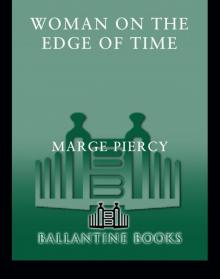 Woman on the Edge of Time
Woman on the Edge of Time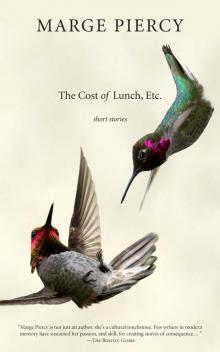 The Cost of Lunch, Etc.: Short Stories
The Cost of Lunch, Etc.: Short Stories Made in Detroit: Poems
Made in Detroit: Poems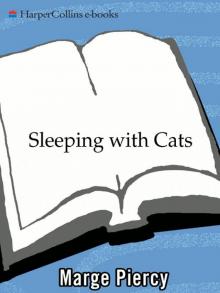 Sleeping With Cats
Sleeping With Cats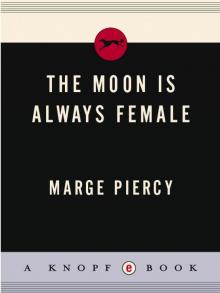 Moon Is Always Female
Moon Is Always Female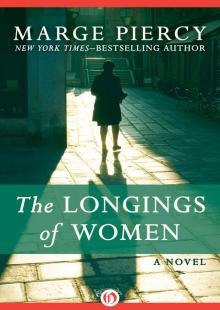 The Longings of Women
The Longings of Women Circles on the Water
Circles on the Water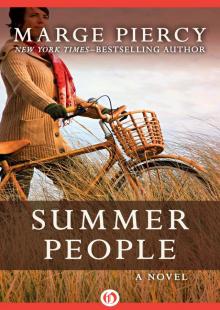 Summer People
Summer People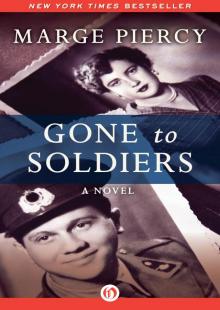 Gone to Soldiers: A Novel
Gone to Soldiers: A Novel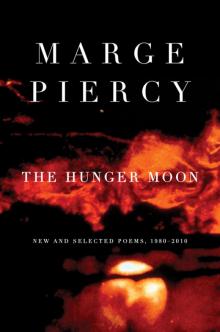 The Hunger Moon: New and Selected Poems, 1980-2010
The Hunger Moon: New and Selected Poems, 1980-2010 Vida
Vida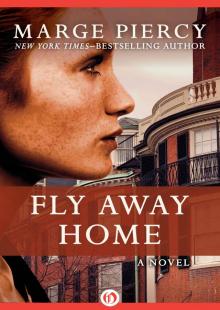 Fly Away Home
Fly Away Home He, She and It
He, She and It So You Want to Write
So You Want to Write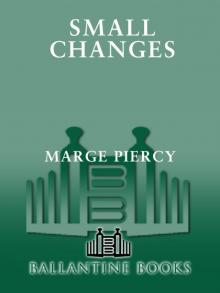 Small Changes
Small Changes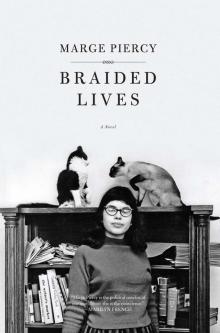 Braided Lives
Braided Lives Lord Valentine's Castle
Lord Valentine's Castle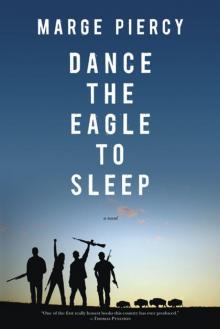 Dance the Eagle to Sleep
Dance the Eagle to Sleep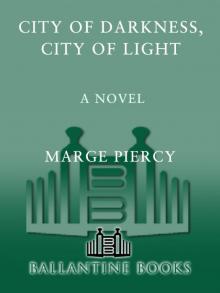 City of Darkness, City of Light
City of Darkness, City of Light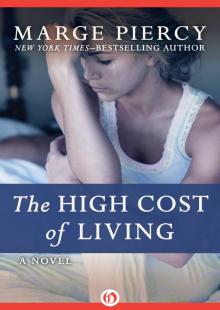 The High Cost of Living: A Novel
The High Cost of Living: A Novel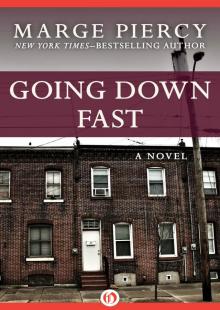 Going Down Fast: A Novel
Going Down Fast: A Novel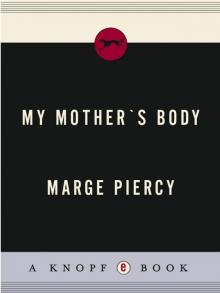 My Mother's Body
My Mother's Body Storm Tide
Storm Tide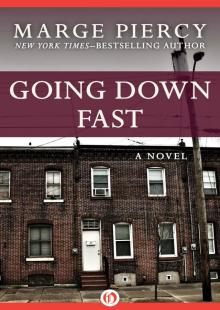 Going Down Fast
Going Down Fast The Third Child
The Third Child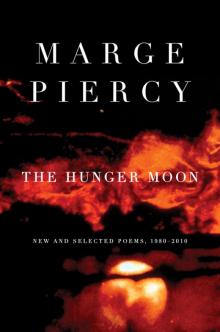 The Hunger Moon
The Hunger Moon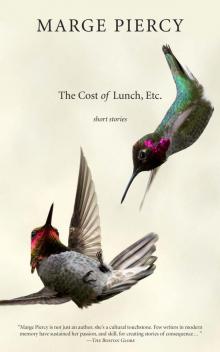 The Cost of Lunch, Etc.
The Cost of Lunch, Etc. Sex Wars
Sex Wars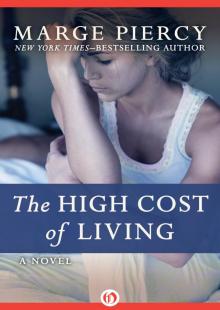 The High Cost of Living
The High Cost of Living Made in Detroit
Made in Detroit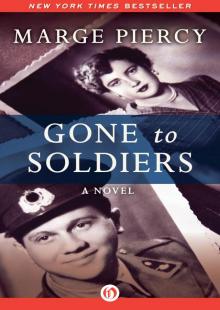 Gone to Soldiers
Gone to Soldiers